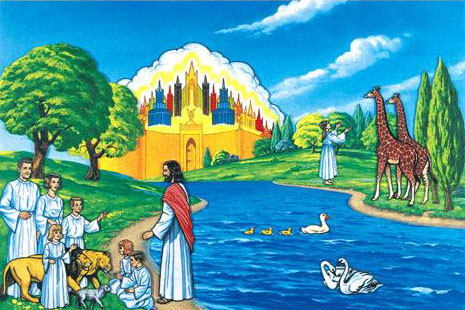I don’t care about heaven.

Ok, that’s a little bit of an exaggeration. but seriously, I don’t think about it all that often. It’s just not that important to me.
That hasn’t always been the case. For a long time, probably the first 23 and a half years of my life, “Are you going to heaven?” was the pivotal question of my Christianity. (actually, if I’m being honest…years 1-4 are kind of a blur, and 5-8 were probably dominated by Legos and Teenage Mutant Ninja Turtles…but somewhere around then, the question was introduced.) At that point, for me, that’s all that Christianity really had to offer. “Why should I be a Christian?” So I go to heaven and not hell when I die. My “relationship” with God, was a pendulum swinging back and forth between guilt about the mistakes I had made and a nervous insecurity about whether or not I had repented recently enough to cancel out said mistakes. To use an all-too-popular phrase, Christianity was nothing more than “fire insurance.”
I also believed that my #1 priority as a Christian was to make sure you didn’t go to hell either. A lot of Christians feel they have this prerogative. We so often base our “success” as a church, ministry, or Christian on the number of people we have “saved” recently. I’d even guess that a majority of Christian youth groups in the country have the unspoken (or spoken) mission of convincing as many kids as possible to raise their hand and pray a prayer before they graduate high school and head out into the cruel, dangerous, heathen-filled world. Then we can say we at least did what we could and got them that insurance policy. Even if they screw up this life, at least their souls are safe from eternal damnation. Right?
But is that really it?
So much of Christianity is caught up in this question. And it’s not only destroying our understanding of the call Jesus has placed on us, but it’s tearing us all apart. (This blog is about the call. We’ll get to the tearing apart next week.)
I do believe Christians have a job to do. The difference is that I don’t believe it has anything to do with saving people. Jesus takes care of that part. I think our call is less about getting ourselves and others to heaven and more about bringing heaven here. I’m talking about cultivating the kingdom here and now – on earth as it is in heaven.
In Luke 17, some religious leaders came to Jesus and asked him when the kingdom would come. His answer? “It’s here – among you, in your midst, within you.” The kingdom is a way of living that is bigger than yourself – it’s about us, not just you. About choosing we instead of me. You have the opportunity to wake up yourself and the world around you, to the kingdom that is here, now.
So what does that look like?
I think it looks like caring for the orphans and the widows (James 1:27). I think it looks like serving the “least of these” (Matthew 25:40) and loving them the same way you love yourself (James 2:8). I think it looks like giving to those in need (1 John 3:17) and sowing generously into the lives of others (2 Corinthians 9:6). I think it looks like doing whatever you were made to do, whatever brings you joy and whatever you’re good at, for God (Colossians 3:23).
Really, I think it looks like a life that brings life to others, that shares life with others. Choosing a life of interdependence, and not independence.
In Matthew 28:19, Jesus tells his disciples to, “Go and make disciples of all nations, baptizing them in the name of the Father and of the Son and of the Holy Spirit.” Notice he doesn’t say, “Go and make converts of all nations,” or, “Go and ‘save’ all nations.” Then in verse 20 he adds, “and teach them to live the way I’ve taught you.”
Jesus’ charge to his followers is to make disciples. We could talk about all that discipleship is or what it looked like in the first century, but simply, Seth Barnes, my boss, defines discipleship as helping reveal to someone their true identity and place in the kingdom. It’s about being close enough to someone that you can see, and speak, into their life. It’s about intimacy and sacrifice and commitment. It’s about showing and teaching each other how to live, not simply telling.
“My dear children, let’s not just talk about love; let’s practice real love. This is the only way we’ll know we’re living truly, living in God’s reality.” (1 John 3:18)
And God’s reality is the kingdom.
may his kingdom come, and his will be done, on earth as it is in heaven.








